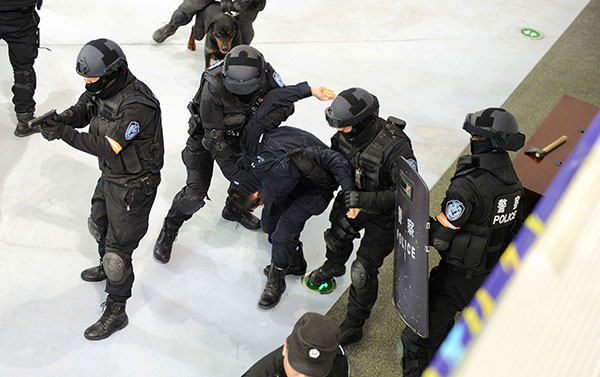Pride and prejudice in anti-terror fight
Updated: 2016-01-04 08:17
By Shi Lan(China Daily)
|
||||||||
 |
|
Police seize a simulated gangster during an emergency drill in Urumqi, Xinjiang Uygur autonomous region, earlier this month. The scenario involved a female audience member at a sports event who was kidnapped by two gangsters with knives. MA YUAN/CHINA DAILY |
The Anti-Terrorism Law, the first of its kind in China, took effect on Jan 1, reflecting the State's determination to fight terrorism and clearly stating how the Chinese authorities are going to do it.
The law comes in the backdrop of rising terrorism across the world - from France to Tunisia, terrorists claimed hundreds of innocent lives and injured even more in 2015. Terrorists have become more brutal; in some cases they killed people indiscriminately instead of taking hostages, as before. On the other hand, political differences among the powers responsible to fight terrorism have prevented the formation of a strong alliance against terrorists.
In the Anti-Terrorism Law, China has given a clear definition of terrorism, and solemnly promised to oppose terrorism in all (its) forms, ban terrorist organizations, and hold the terrorist organizations accountable. It is China's unambiguous legal document and conforms to the new developments in the global fight against terrorism.
At this critical juncture, it is necessary for Western governments and media outlets to judge China's fight against terrorism objectively. However, they seem to do exactly the opposite. In a recent report, The New York Times said the law was controversial. It even expressed worries it (the law) could violate human rights such as freedom of speech.
The case of Ursula Gauthier, a journalist for French magazine Le Nouvel Observateur (The New Observer) in Beijing, triggered discussions recently because the Chinese authorities refused to renew her visa unless she apologized for one of her articles. On Nov 18, when the Chinese people and government were sympathizing with the French people for the deaths of people in the Nov 13 terrorist attacks in Paris, Gauthier wrote an article on the magazine's website attributing the terrorist attacks in China on the "improper" policies against the Uygur community.
Just like Hua Chunying, spokeswoman of the Ministry of Foreign Affairs, said at a press conference, the article, like many Westerners' views, followed an absurd logic based on political bias and double standard.
Gauthier's article drew protests and opposition from readers both in China and France, and her case should be a lesson for journalists who adopt double standard on terrorism.
Terrorism was the greatest threat to the international community in 2015. Rampant terrorism wreaked havoc not only in Africa, the Middle East and South Asia, but also in Europe, China and the US. And for that, the chaos in the Middle East is not the only factor to blame; the "support" (intended or unintended) of some states, people and media outlets to terrorist outfits is also responsible. As such, those opposing China's Anti-Terrorism Law are actually supporting terrorism despite not realizing it.
China studied from the experiences of Western countries and considered its own situation and needs before drafting and passing the law. And the Chinese authorities solicited the opinions of the people on the law before adopting it.
The Anti-Terrorism Law has special sections on international cooperation, such as suspected terrorists should be denied entrance documents or that militaries of different countries should cooperate with each other in the fight against terrorism. The law has laid a solid foundation for China and its partners in the international community to join hands to fight terrorism. Let's hope they do so in reality to eradicate the common threat.
The author is deputy head of the Institute of Central Asia Studies at Xinjiang Academy of Social Sciences.
- China says no tolerance for defending terrorism as French journalist leaves
- China adopts first counter-terrorism law
- Highlights of China's newly adopted counter-terrorism law
- Internet firms to aid anti-terrorism mission
- China adopts first counter-terrorism law in history
- China slams US double standards on terrorism
- Anti-terrorism law in works
- China's new draft law redefines 'terrorism', regulates media coverage
- China vows to tighten crackdown on terrorism
- Neighbors join to fight terrorism
- Global health entering new era: WHO chief
- Brazil's planning minister steps aside after recordings revelation
- Vietnam, US adopt joint statement on advancing comprehensive partnership
- European border closures 'inhumane': UN refugee agency
- Japan's foreign minister calls A-bombings extremely regrettable
- Fukushima impact unprecedented for oceans: US expert

 Stars of Lijiang River: Elderly brothers with white beards
Stars of Lijiang River: Elderly brothers with white beards
 Wealthy Chinese children paying money to learn British manners
Wealthy Chinese children paying money to learn British manners
 Military-style wedding: Fighter jets, grooms in dashing uniforms
Military-style wedding: Fighter jets, grooms in dashing uniforms
 Striking photos around the world: May 16 - May 22
Striking photos around the world: May 16 - May 22
 Robots help elderly in nursing home in east China
Robots help elderly in nursing home in east China
 Hanging in the air: Chongqing holds rescue drill
Hanging in the air: Chongqing holds rescue drill
 2.1-ton tofu finishes in two hours in central China
2.1-ton tofu finishes in two hours in central China
 Six things you may not know about Grain Buds
Six things you may not know about Grain Buds
Most Viewed
Editor's Picks

|

|

|

|

|

|
Today's Top News
Liang avoids jail in shooting death
China's finance minister addresses ratings downgrade
Duke alumni visit Chinese Embassy
Marriott unlikely to top Anbang offer for Starwood: Observers
Chinese biopharma debuts on Nasdaq
What ends Jeb Bush's White House hopes
Investigation for Nicolas's campaign
Will US-ASEAN meeting be good for region?
US Weekly

|

|







